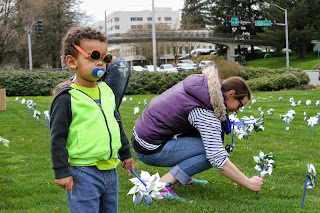
The spectrum of perinatal emotional complications are referred to as Perinatal Mood and Anxiety Disorders (PMADs). They can begin during pregnancy or after birth. Mothers, fathers, and adoptive parents also can experience mood and anxiety disorders during pregnancy and/or the postpartum period.
Many of us refer to emotional complications after birth as “postpartum depression” or just “postpartum”. However, we know that perinatal emotional complication are not just depression and that many women experience emotional changes that begin during pregnancy- this is why we refer to them as a spectrum that includes many different responses to the changes we are experiencing.
Perinatal Emotional Complications can interfere with a family’s joy over a new baby and interrupt the parent-infant bonding process. They can appear as late as a year postpartum and during significant hormonal changes such as weaning from the breast or the return of menstruation.
The following lists of symptoms can be applied to both pregnant and postpartum parents.
The fast facts about “Baby blues”
Nearly 85 percent of all new mothers experience the baby blues after giving birth. Baby blues will only last 2-3 weeks and will improve with self care such as eating and sleeping. Anything after this 2-3 week period could indicate something other than baby blues.
Depression
• Feelings of despair/hopelessness
• Crying, tearfulness
• Anger and irritability
• Sleep disturbances (too much/little)
• Loss of energy and interest
• Physical symptoms (clumsiness, slowed speech, etc.)
• Suicidal thoughts
• Frightening thoughts about self, baby or other family members
• Weight loss or gain
• Feelings of guilt, shame, inadequacy
• Hypochondria, excessive worries
Anxiety
• Muscle tension
• Chest pain
• Shortness of breath; choking sensation
• Hot/cold flashes
• Tingling hands/feet
• Agitation/restless
• Fear of dying
• Fear of going crazy
• Faintness
• Irritability
• Anger/rage
• Fear of being alone, fears about baby’s health, agoraphobia
• Feeling trapped, immobilizing guilt
• Racing heartbeat
• Hyperventilating
• Nausea/vomiting
• Diarrhea
• Dizziness
Obsessive Compulsive Disorder
• Recurring, persistent and disturbing thoughts, ideas or images (scary images of accidents, abuse, harm to baby)
• Ritual behaviors done to avoid harming baby (e.g., put away knives) or to create protection for baby (e.g., don’t leave the house), constantly checking the baby, house, etc.
• Intrusive thoughts, fears, images
• Person cannot control thoughts
• Person understands that to act on these thoughts would be wrong
• Hypervigilant (e.g., can’t sleep for fear that something will happen to baby/ constant “fight or flight” mode)
• Post-Traumatic Stress Disorder (usually occurs soon after birth)
• Previous trauma (recent or in the past – abuse, accident, etc.)
• Feeling of anxiety when exposed to situations similar to the trauma
• Sensations of “being in the trauma” now
• Nightmares
• Emotional numbing/detachment
DEL is a strong advocate of the campaign,
"Speak Up When You are Down." If you feel you have any of these symptoms or are concerned about a loved one, call 1.888.404.7763 for support. The hotline is operated through a partnership with
Perinatal Support Washington.
Up to 80 percent of new mothers experience some form of baby blues. Postpartum depression (PPD) is more than the baby blues, and it won’t go away on its own. Help is available.
Talking about how you feel is the first step.
The Washington State Postpartum Depression Awareness Campaign (Speak Up When You're Down) is the result of 2005 legislation to provide a public awareness campaign to educate women and their families about the signs, symptoms and treatment of PPD.
Talking about PPD can be the first step toward recovery. The campaign message, “Speak Up When You’re Down,” encourages women and their families to talk openly with each other and with their health care provider if they are feeling down.
Washington residents and agencies may order hard copies of these materials by sending an email with their address and requested quantity to
strengtheningfamilies@del.wa.gov.
 In
addition to our pinwheels, we also want to invite everyone in Washington to
participate in Wear Blue Day on April 6th to stand in solidarity against child
abuse. It’s easy – just wear blue!
In
addition to our pinwheels, we also want to invite everyone in Washington to
participate in Wear Blue Day on April 6th to stand in solidarity against child
abuse. It’s easy – just wear blue!




















